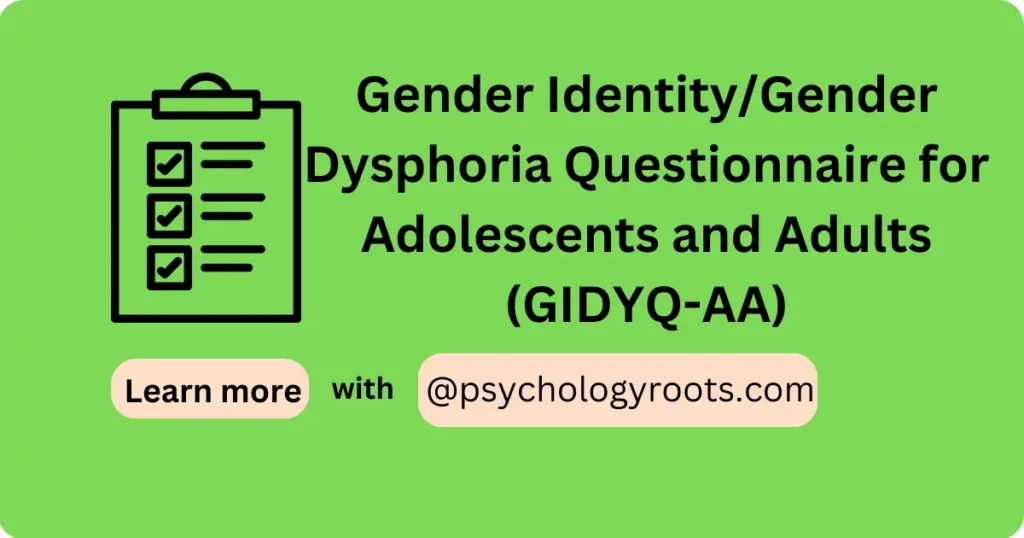Table of Contents
Gender Identity/Gender Dysphoria Questionnaire for Adolescents and Adults (GIDYQ-AA)
Here in this post, we are sharing the “Gender Identity/Gender Dysphoria Questionnaire for Adolescents and Adults (GIDYQ-AA)”. You can read psychometric and Author information. We have thousands of Scales and questionnaires in our collection (See Scales and Questionnaires). You can demand us any scale and questionnaires related to psychology through our community, and we will provide you with a short time. Keep visiting Psychology Roots.
About Gender Identity/Gender Dysphoria Questionnaire for Adolescents and Adults (GIDYQ-AA)
Scale Name
Gender Identity/Gender Dysphoria Questionnaire for Adolescents and Adults (GIDYQ-AA)
Author Details
Joseph J. Deogracias
Translation Availability
Not Sure

Background/Description
The Gender Identity/Gender Dysphoria Questionnaire for Adolescents and Adults (GIDYQ-AA) emerged in 2007 to address the growing need for a reliable and comprehensive tool to assess individuals experiencing gender dysphoria. Recognizing the complexities of gender identity and its interplay with dysphoria, researchers led by Joseph J. Deogracias developed the GIDYQ-AA as a self-report measure for adolescents and adults.
Composed of 27 items, the questionnaire delves into four key aspects:
- Gender Identity: This subscale explores an individual’s internal sense of being male, female, both, neither, or something else.
- Social Dysphoria: It examines distress related to being perceived or treated in a way that doesn’t match one’s gender identity.
- Physical Dysphoria: This subscale focuses on discomfort with physical characteristics associated with one’s assigned sex at birth.
- Psychological Dysphoria: It assesses emotions like anxiety, shame, or depression resulting from gender incongruence.
By scoring each item on a scale of 0 (never) to 4 (always), individuals provide insight into their personal experiences with gender dysphoria. While the GIDYQ-AA offers valuable information, it’s crucial to remember that it’s not a diagnostic tool. Its purpose lies in aiding self-exploration and potentially informing discussions with mental health professionals who can provide comprehensive assessments and support.
The GIDYQ-AA’s development marked a significant advancement in understanding gender dysphoria, offering a standardized tool for research and clinical settings. However, it’s important to stay updated on ongoing research and evolving perspectives on gender identity and dysphoria to ensure responsible and informed interpretation of the questionnaire’s results.
Administration, Scoring and Interpretation
- The GIDYQ-AA is typically administered individually in a safe and supportive environment.
- The administrator explains the purpose, instructions, and ensures informed consent before proceeding.
- The participant reads each statement and chooses the response that best describes their experience on a 5-point scale.
- There are no right or wrong answers, and honesty is encouraged.
- After completing the questionnaire, the administrator may discuss the results and implications with the participant, but cannot provide diagnosis or treatment recommendations.
Reliability and Validity
The GIDYQ-AA has been generally considered reliable and valid for assessing gender identity and gender dysphoria, however, it’s important to approach its strengths and limitations with nuance:
Strengths:
- Internal consistency: Studies have shown strong internal consistency with Cronbach’s alpha values exceeding 0.8, indicating good reliability in measuring what it’s intended to measure.
- Discriminant validity: Research demonstrates the GIDYQ-AA’s ability to differentiate between individuals with gender dysphoria and those without, showing sensitivity and specificity.
- Convergent validity: Scores on the GIDYQ-AA correlate with other measures of gender dysphoria and related constructs, supporting its validity.
- Widely used: The GIDYQ-AA is a popular tool in research and clinical settings, allowing for comparisons across studies and populations.
Limitations:
- Self-report measure: Like all self-report measures, the GIDYQ-AA relies on individual honesty and accurate self-awareness, which may not always be present.
- Cultural limitations: The GIDYQ-AA’s development primarily focused on Western contexts, and its generalizability to diverse cultures requires further research.
- Not a diagnostic tool: It’s crucial to remember that the GIDYQ-AA is not intended for diagnosis and its results should be interpreted by qualified professionals alongside other assessments.
- Potential for misuse: Improper use or interpretation of the GIDYQ-AA could lead to misunderstandings or harmful decisions.
Available Versions
27-Items
Reference
ZUCKER, K. J. Gender Identity/Gender Dysphoria Questionnaire.
Deogracias, J. J., Johnson, L. L., Meyer-Bahlburg, H. F. L., Kessler, S. J., Schober, J. M., & Zucker, K. J. (2007). Gender Identity/Gender Dysphoria Questionnaire for Adolescents and Adults (GIDYQ-AA) [Database record]. APA PsycTests.
https://doi.org/10.1037/t63032-000
Important Link
Scale File:
Frequently Asked Questions
What is it?
Self-report questionnaire assessing gender identity & dysphoria in adolescents & adults.
Who can use it?
Qualified mental health professionals, not for self-diagnosis.
How is it administered?
Individually, in a safe & supportive environment, by a trained professional.
Is it reliable & valid?
Generally yes, but has limitations (self-report, cultural bias).
Disclaimer
Please note that Psychology Roots does not have the right to grant permission for the use of any psychological scales or assessments listed on its website. To use any scale or assessment, you must obtain permission directly from the author or translator of the tool. Psychology Roots provides information about various tools and their administration procedures, but it is your responsibility to obtain proper permissions before using any scale or assessment. If you need further information about an author’s contact details, please submit a query to the Psychology Roots team.
Help Us Improve This Article
Have you discovered an inaccuracy? We put out great effort to give accurate and scientifically trustworthy information to our readers. Please notify us if you discover any typographical or grammatical errors.
Make a comment. We acknowledge and appreciate your efforts.
If you have any scale or any material related to psychology kindly share it with us at psychologyroots@gmail.com. We help others on behalf of you.